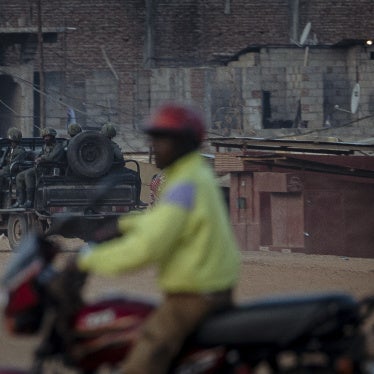The Burmese government freed more than 200 political prisoners this week, a move many in the West are hailing as a sign it's time to repeal economic sanctions. Their argument is that the regime needs encouragement to continue the embryonic and fragile reforms put forward this year.
But the release is not as significant as it first appears. First of all, an estimated 1,900 political prisoners remain. And the political showmanship is consistent with the regime's ongoing strategy of using thousands of dissidents, Buddhist monks and nuns, artists, labor activists, writers, and hip hop stars as human bargaining chips to repress Burmese society and negotiate with the international community.
The use of mass amnesties of prisoners, in which thousands of common criminals and only a handful of dissidents are freed, is a longstanding practice. In the 10 amnesties since 2004, 60,000 people have been freed, but only 600 were political prisoners. After they are released, many dissidents are soon back in prison.
Burma's most famous comedian, Zarganar, is a case in point. Released this week, he has been in and out of prison since the 1980s, banned from public performances. In 2009, he was sentenced to an astonishing 59 years, later reduced to 35, after he criticized the government's incompetent response to 2008's Cyclone Nargis.
Mr. Zarganar's pugnacious attitude hasn't been dulled by prison, though. In one of his first interviews after his release he called for all political prisoners to be released and said "art and politics are interrelated, I will continue to do both of them."
Likewise, labor rights advocate Su Su Nway has been amnestied before. She was imprisoned in 2005 for lodging a formal complaint against an official who had made her perform forced labor. She was released but participated in peaceful protests in Rangoon in 2007, and raised a banner critical of the government at the hotel where then U.N. Special Envoy on Human Rights in Burma Paulo Pinhiero was staying. For these acts, a Burmese court sentenced her to 12.5 years in prison, later reduced to 8.5 years.
But we should not forget the prisoners who weren't released. For example, Min Ko Naing and other leaders of the 88 Generation Students Group, student activists from the 1988 uprising, have spent much of the past two decades in prison, using their fleeting freedoms to call for dialogue with the government. All have been sentenced to 65 years in prison, and there have no signals so far that any of this group will be released.
As the experience of many political prisoners makes clear, and as I have seen in the 15 years I have studied the human rights situation in Burma, the Burmese judicial system is used for control, not justice. The evidence is starkly apparent in the astonishing sentences handed down in recent years—65 years for marching peacefully in a call for lower commodity prices, 20 years for blogging about protests, and other long terms for writing poems or sending information to exile Burmese news organizations.
The release of this group of political prisoners as part of an amnesty of 6,300 can be seen as a gesture, perhaps encouraging but very limited, on the part Burma's new nominally civilian government of President Thein Sein. It comes after years of international pressure to free dissidents. More releases are expected, but nothing short of the total and unconditional release of all political prisoners should be acceptable.
The new government, largely led by senior figures of the previous military dictatorship, has promised bold economic, political and legislative reforms, softened their Stalinist rhetoric with references to human rights and democracy, and loosened censorship. The official mantra is "good governance, clean government, flourishing of democratic practices, ensuring rule of law [and] making economic reform." Officials have invited exiled dissidents to return.
Outside observers are both bewildered and encouraged by the prisoner releases. But even if Burma's leaders release every unjustly jailed prisoner—which would be wonderful—that would still not be a "reform." Reform requires changes in laws and institutions. The government needs to repeal the repressive and vague laws used to stifle dissent. Bills in the national parliament that guarantee freedom of assembly and the ability to form unions, and the formation of a national human rights commission sound promising, but fall short of international standards.
One test of whether releasing even this small group of dissidents means anything will be the quality of their freedom. Will they be subjected to the same vicious cycle of freedom, activism, repression and arrest they have endured for decades?
The onus is on the government to prove it is serious by allowing the freed dissidents the basic freedoms of speech, assembly and participation in public affairs they have long called for, and sacrificed so much to realize. This amnesty should be viewed as an opportunity for the government to bring about genuine national reconciliation. Mr. Zarganar and his contemporaries will continue to risk their new-found freedom to press for real change, and the international community should back them up.
Mr. Mathieson is a senior researcher in the Asia Division of Human Rights Watch.








